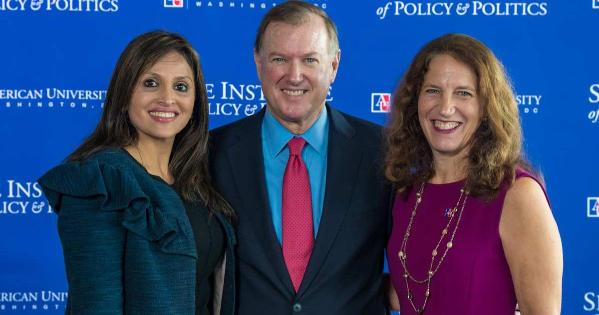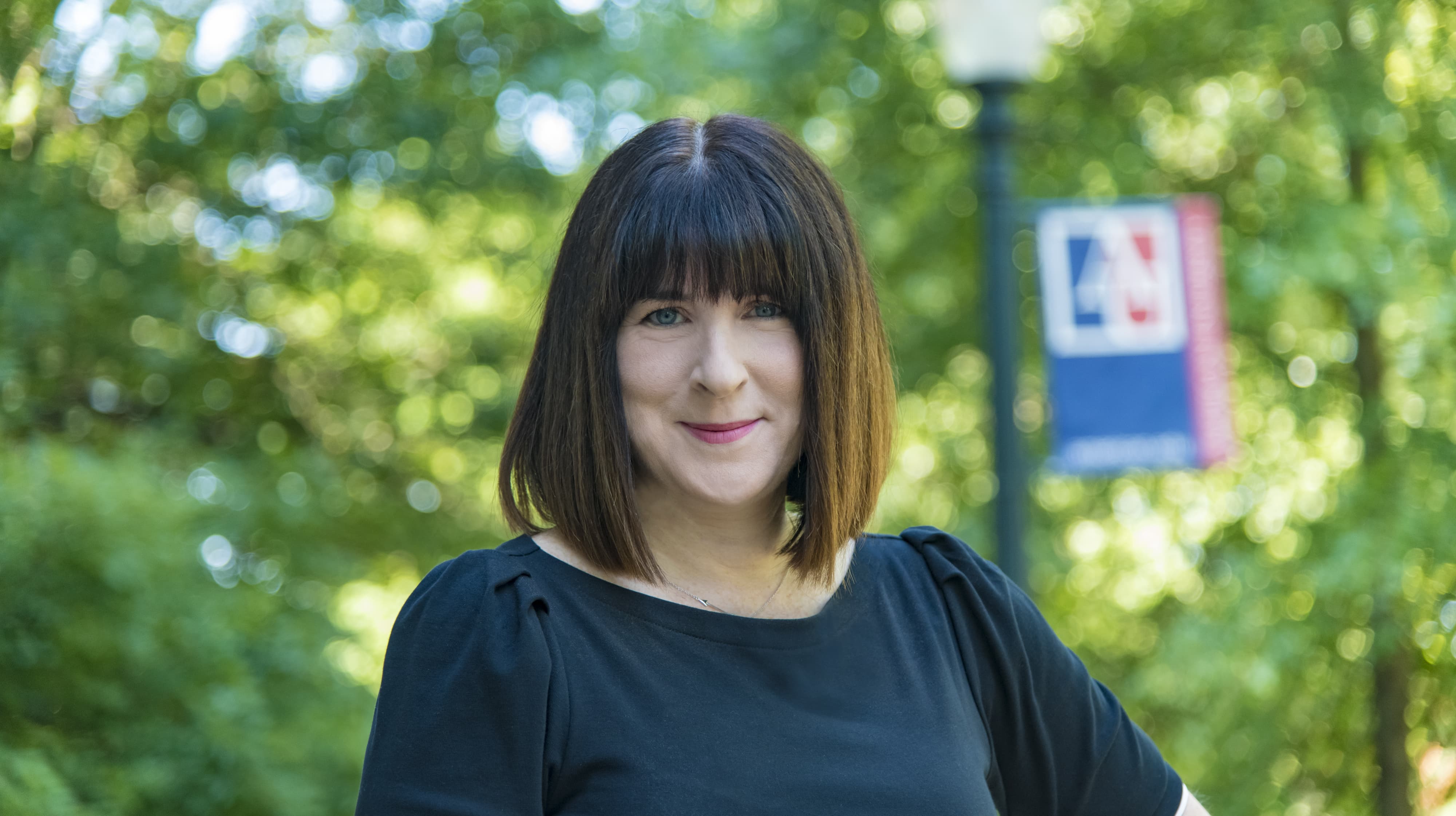Three Years in, Sine Institute Continues to Grow

With a career spent in politics and government, Amy K. Dacey feels strongly that change can happen when people with different opinions and backgrounds come together to solve problems.
So Dacey, a former executive director of EMILY’s List and CEO of the Democratic National Committee, felt like she found a home outside of politics when she heard the pitch for AU’s Sine Institute of Policy and Politics. That home was a literal one: Dacey received her master’s in political science at AU, and her first job in Washington was at AU’s bookstore.
“I was immediately intrigued after learning about the plans and felt like, ‘This has to be my job,’“ Dacey said. “It was all coming together, this history of working in politics, my love for AU, and the ability to create something really significant.”
As it kicks off its fourth class of fellows, Sine has realized that impact and lived up to AU’s Challenge Accepted ethos.
The fellowship classes have included foreign leaders, governors, US presidential advisors, former US cabinet secretaries, prominent journalists, a three-star general, politicians, and business leaders.
"We've really arrived,” said Jeff Sine, SIS/BA ’76, whose gift along with wife Samira Sine, founded the institute. “We are on the map, and we're getting amazing people to be fellows. I think we've been able to pull the students into these dialogues and into creating co-curricular opportunities for them to learn.”
AU President Sylvia Burwell collaborated with Sine on the idea of creating a vehicle where people from different viewpoints can have honest and open discussions about today’s problems. She wanted an institute of politics and policy, and Sine found the vision so compelling that he and Samira gifted $10 million, an increase in what he said they planned on giving.
“Solving today’s challenges requires people from different political backgrounds and perspectives coming together for constructive, fact-based dialogue,” Burwell said. "The Sine Institute is leading this critical civil discourse through the work of our outstanding fellows, the engagement with our students, and the development of ideas that can make an impact.”
Sine, who also serves as an AU board member and previously helped create the Community-Based Scholars Program, was excited by the prospect of the institute.
“I was so excited by the picture that she painted,”he said. "I'm much more inclined to support something that's programmatic as opposed to bricks and mortar. The reason that I prefer that is because it has a tangible and direct impact on the students and the faculty.”
The key for everyone involved: to make sure Sine operated in a bipartisan fashion and provided an avenue for respectful dialogue.
The first class of fellows included Abdul El-Sayed, the former executive director of the Detroit Health Department, Washington Post columnist Ruth Marcus, former Tennessee governor Bill Haslam, playwright Karen Zacarias, and political commentator William Kristol. Then CEO of Northrop Grumman Wes Bush visited as the first distinguished lecturer.
“There’s always going to be differences between the parties and even within the parties,” Dacey said. “There’s also a feeling, especially at the national level, that there’s challenges with dialogue and polarization. I think we have a great opportunity to show examples of people coming together and finding solutions.”
Since the first class, fellows have included members of the George W. Bush, Obama, and Trump administrations. Dacey has worked on national committees and a presidential campaign in Democratic politics. But she said connecting with Republicans working on the issues of the day has been exciting. One Sine event hosted former chiefs of staff to Bush and Obama, Joshua Bolten and Jacob J. Lew. The men had very different bosses and experiences, Dacey said, but they could share why their job matters and why public service matters in the same room.
“Sometimes our students don't like the politics, but that is designed into the building blocks of the Institute,” Sine said. “We welcome students disagreeing. You don't have to agree with them, but you do have to be respectful towards them, and they have to respect you. That's the deal.”
Dacey also said providing an array of experts on diverse topics remains a focus. Fellows included social media and tech leaders. Wes Moore, the CEO of Robin Hood Foundation, discussed economic justice, philanthropy, poverty, and sustainability. Former Croatian president Kolinda Grabar Kitarovic tackled NATO’s role in today’s geopolitical landscape. Katherine Miller, vice president of impact at the James Beard Foundation, spoke about elevating food system issues into policy debates and the power of the chefs and the restaurant industry to make meaningful change.
“You bring people from several different sectors with different voices to solve these big problems,” Dacey said. “That was very exciting for me from the start and really important to create opportunities for students on campus to understand the importance being involved in the process.”
 Amy K. Dacey is the director of the Sine Institute of Policy and Politics. (Photo by Jeffrey Watts)
Amy K. Dacey is the director of the Sine Institute of Policy and Politics. (Photo by Jeffrey Watts)
Sine fellow H.R. McMaster said teaching students how to ask the right questions, to keep an open mind, and to make their own judgments remain crucial tenants to solving complex issues.
“I think it is really crucial to understand the challenges to our security, our prosperity, and our influence in the world,” said McMaster, a former National Security Advisor. “(Discussing) those challenges and how to overcome those challenges with students at American University is a tremendous opportunity.”
The Sine Institute’s impact travels well past its signature fellowship program. The institute has held more than 125 events, and more than 175 guest speakers have appeared at Sine events, including Pulitzer Prize winning New York Times columnist Nick Kristof, Top Chef host Tom Colicchio, Maryland governor Larry Hogan, and former HUD secretary Julian Castro, who is now a 2022 spring fellow. The institute also presents distinguished lecturers, which includes Bush, former Australia ambassador to the US Joe Hockey, former US deputy national security advisor Dina Powell, the mayors of Chicago and Miami, Lori Lightfoot and Francis Suarez, and Patagonia CEO Ryan Gellert.
Dacey said she’s constantly recruiting and receiving recommendations for the next class, and she’s already been working towards 2023. The focus is tackling significant problems but also addressing new issues for the institute each year. Working far ahead makes it difficult to predict what topics could become relevant in the future. But bringing guest speakers to Sine allows for an even greater diversity of opinion and provides flexibility to respond to current events.
Sine held an event with WCL during the impeachment hearing for President Trump, provided presidential debate coverage, and held events with the Women and Politics Institute on elections.
“We want to have really timely conversations, whether that be what goes on in a presidential debate or a journalist’s perspective on a story, or election analysis,” Dacey said.
Sine added a summer series in 2022 called Reimagining America that focused on how to rebuild after the COVID-19 pandemic. US assistant secretary for health Rachel Levine, former New Zealand prime minister Helen Clark, and former NFL player and TikTok’s director of government affairs were among those who appeared during the six events.
Dacey said she hopes to build on the success of the summer series by taking Sine on the road during summer 2022, appearing in areas with high alumni concentrations.
“I would love to go on the road,” Dacey said. “It’s an election year, so trying to get a pulse on what’s happening in the states and what issues matter to people is important.”
The reach has grown with the institute more than doubling participation in 2021 spring fellows programs from 2020. More than 7,500 people representing more than 60 countries have attended Sine events.
“I think we're really making substantial progress,” Sine said. “It'll be a very powerful feedback loop where AU is both contributing to the dialogue and contributing to knowledge creation, but at the same time creating opportunities for faculty and students.”
